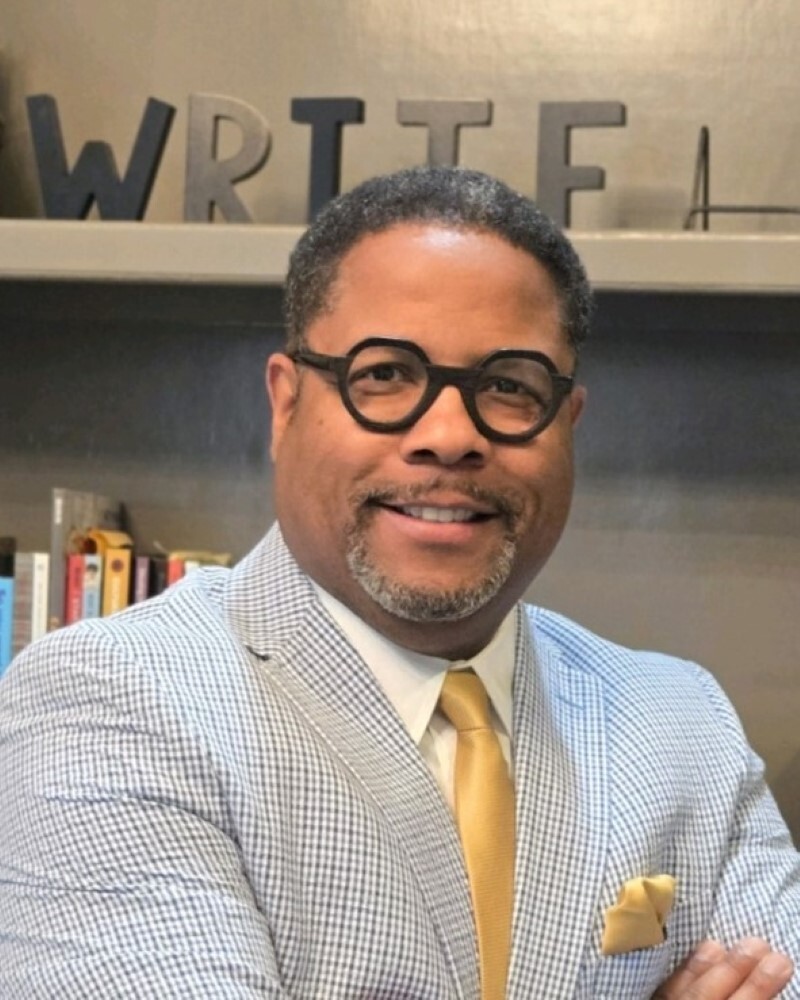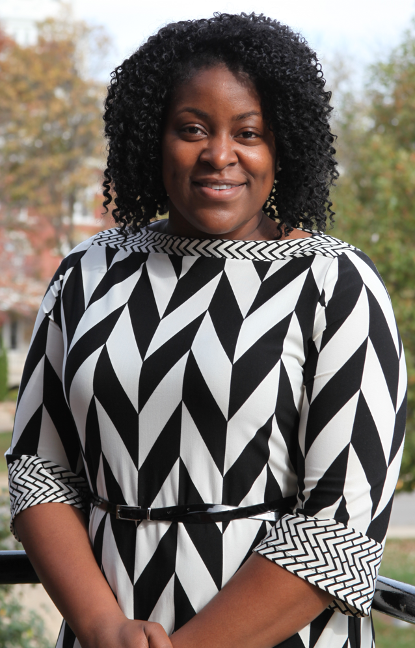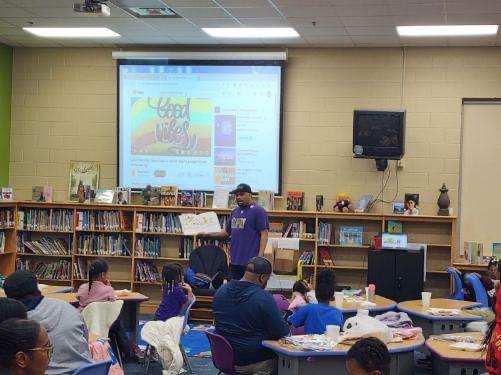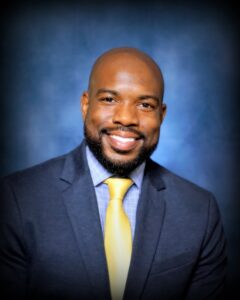By Jenna Somers and Krystal Schmidt

“I believe Vanderbilt University should be at the forefront of helping our nation solve some of the most complex and pressing problems, including those related to race and racism,” said Rich Milner, Cornelius Vanderbilt Chair of Education at Peabody College of education and human development.
Milner began his career at Vanderbilt in 2001, becoming the first Black faculty member to earn tenure and promotion at Peabody College before accepting a new position in 2013. When Milner was recruited back to Vanderbilt in 2018, he recognized that the university was home to many faculty, students, and staff deeply engaged in studying race inside and outside the field of education. In hopes of building synergy among this community of researchers and practitioners, Milner founded the Initiative for Race Research and Justice (RRJ) that same year.
As a scholar of urban teacher education who studies social contexts, Milner understands how learning ecosystems, policies, and practices intersect with race. This understanding informed his leadership as president of the American Educational Research Association in 2022-2023. Through research, RRJ seeks to improve these ecosystems, policies, and practices and to disseminate resources and tools, in collaboration with community partners, to advance racial justice and disrupt systemic inequities across education landscapes.
“Rich Milner’s visionary leadership at the Initiative for Race Research and Justice has positioned Vanderbilt as a leader in strengthening education equity. Through rigorous research and community engagement, RRJ helps solve real-world problems and is a shining example of how Peabody mobilizes scholarship to creative meaningful change,” said Camilla Benbow, Patricia and Rodes Hart Dean of Education and Human Development.
To that end, RRJ leads and collaborates on several community-focused research initiatives, including studying STEM educational opportunities for people impacted by the carceral system, developing surveys and related tools to identify and support equity-minded school leaders, studying opportunity gaps in elementary school students’ literacy development, and fostering civil dialogue between and among Nashville high school students.

Assisting in overseeing these and similar initiatives is Dena Lane-Bonds, assistant director and research scientist at RRJ. She engages with campus and community partners to translate RRJ’s scholarship into practice.
“I enjoy working at a place that seeks to advance racial equity and is at the forefront of innovation, where we can see the tangible impact of our research in shaping narratives, advancing practice, and driving policy reform,” said Lane-Bonds. “Every day, I am inspired by our collective determination and contributions to dismantle systemic injustices and to create a more equitable society through cutting-edge research that paves the way for transformative action by addressing pressing local and national challenges in education.”
STEM Opportunities in Prison Settings
In the same year that Milner founded RRJ, the Brookings Institution reported that the 37208 ZIP code in North Nashville had the highest incarcerated population in the country at 14 percent, and 42 percent of children there lived in poverty.
Many students from underserved communities like 37208 face “opportunity gaps” in schools, as Milner writes about in his book, Start Where You Are, But Don’t Stay There: Understanding Diversity, Opportunity Gaps, and Teaching in Today’s Classroom. “Opportunity gaps”—as opposed to what has historically been referred to as “achievement gaps”—are gaps in educational outcomes caused by systemic exclusion from critical classroom learning time. Milner has found that exclusionary practices of the educational system, which disproportionately affect students of color, create “opportunity gaps.”
These exclusionary practices, known as “push out,” include the removal of students from classrooms, schools, and/or districts. Milner and colleagues have written about ways to help educators recognize how these practices may contribute to school-to-prison pipelines and how to build and implement restorative practices. In an episode of The sySTEM Impacted podcast, produced by STEM Opportunities in Prison Settings (STEM-OPS), Milner also connects “pushout” and “opportunity gaps” in working together to create the school-to-prison pipeline that RRJ seeks to disrupt.
“We know from research that ‘push out’—which can eventually lead to prison—happens often in STEM-related courses in K-12 settings, so we were interested in learning more about STEM experiences in schools of formerly incarcerated people. We are attempting to identify practices and policies that may have contributed to these people’s successes, challenges, and eventual incarceration,” Milner said.
In addition to studying how to disrupt the school-to-prison pipeline, RRJ has been working to learn about higher education in prison STEM-related programs.
STEM-OPS is a five-year, $5.2 million project funded by the National Science Foundation’s Eddie Bernice Johnson INCLUDES National Network that culminated this summer. A co-PI on the grant, RRJ collaborated with organizations across the country, including Princeton University’s Prison Teaching Initiative, From Prison Cells to PhD, Operation Restoration, and the Education Development Center. Together, they sought to make STEM learning commonplace and successful in prisons and to explore ways to offer high-quality, culturally responsive STEM education to people who were previously denied access and impacted by the justice system. Importantly, people who have experienced incarceration were involved in all aspects of the project as valued colleagues and key stakeholders.
Through interviews with, and survey responses from, formerly incarcerated people the research team found numerous ways that higher education prison programs can better support students and impacted communities:
- Recruit and retain justice-impacted people into decision-making and teaching roles
- Offer mental health support in classrooms and communities
- Share the stories of justice-impacted people with P-12 students
- Systematically gather and study the stories of formerly incarcerated people
- Enhance learning technologies in prisons
- Create tools for students and decision makers to offer each other feedback
- Move beyond pre-packaged higher education programs
- Provide sustained support for English emergent/multilingual learners
- Focus on learning and development outside of traditional classroom spaces
- Cultivate and support instructor pedagogical development
Based on their findings, the STEM-OPS collaborative created evidence-based toolkits and resources for institutions interested in establishing STEM education programs in prisons. The team also worked with employers to connect formerly incarcerated job seekers with STEM employment opportunities.
“I had the opportunity to change the trajectory of my life from me being a convict to a scholar. My college career really took off at East Jersey State Prison,” said Dameon Stackhouse, a student in the Princeton University Prison Teaching Initiative.
Leaders for Equity in Educator Development
If “push out” in schools increases students’ chances of going to prison, then how can schools and educator preparation programs take proactive steps to reduce this trend and to create more equitable, engaged, and justice-centered educational environments? To answer that question, RRJ is collaborating with researchers at North Carolina State University and the University of South Florida on We-LEED (Leaders for Equity in Educator Development), a two-year, $908,818 project, funded by the Wallace Foundation.
The team is developing and validating a survey instrument to help school leadership programs assess potential school leaders’ knowledge, beliefs, and mindsets (KBMs) related to race and equity, and to identify areas for professional learning and development to enhance equity KBMs among pre- and in-service educators. The survey draws from literature on race, equity, and school leadership and two other surveys designed by Milner and his colleagues, the Teacher Race Talk Survey and the Opportunity Gaps Survey.
“We know from research that knowledge, beliefs, and mindsets impact educators’ practices. So, we’re trying to identify educators with high-equity knowledge, beliefs, and mindsets to build strong equity-minded principal pipelines and to diversify principal pipelines with more potential candidates of color. We also want to identify equity gaps, those low equity mindsets, that could be addressed through professional learning,” Milner said.
The research team concluded phase one of a pre-pilot and is now in phase two of piloting the survey with schools across the Northeastern and Southeastern U.S. They plan to produce a validated instrument and supplementary curriculum guide to support school districts in selecting school leaders and in offering additional professional learning opportunities.
Reinforcing Education and Learning
It is important to note that while Milner has advanced an opportunity gap framework to describe why some students of color do not succeed in school, Milner and RRJ adopt an asset-based approach to their research. As they expose gaps in opportunity, they simultaneously identity assets among the people and communities they study. Even if districts employ equity-minded school leaders, those leaders also need community and family support to close opportunity gaps and build on their many strengths. Through Project REAL (Reinforcing Education and Learning), funded by the Dollar General Foundation and a Peabody Small Grant, the RRJ team works with Nashville schools, communities, and families to help them identify literacy assets among elementary school students.

Literacy Nights are Project REAL’s signature event, held at Jones Paideia Elementary School in North Nashville, the 37208 ZIP code. An invited book author reads aloud to children, engages with them in literary activities, and discusses their lived experiences and the writing process. Families receive culturally relevant books to read at home, and RRJ offers guidance to parents on how to support their children’s literacy, while building on their assets. Project REAL has hosted four Literacy Nights since 2021, supporting more than 300 students, families, and educators who attended.
“The RRJ Literacy Nights at Jones Paideia are impactful and engaging,” said Myra Taylor, former principal at Jones Paideia. “Our students and parents are able to interact with the team and learn and practice strategies that will transfer over to homework help and reading at home. We are fortunate to have Vanderbilt’s RRJ Team as community partners who focus on relevant, real, and accessible strategies and initiatives to support our community of families.”
In addition to Literacy Nights, RRJ also partners with the Community Reads program and Watson Grove Church to extend reading opportunities and potentially transformative reading materials across the 37208 ZIP code and other historically under-resourced communities in North Nashville. In addition, RRJ helps curate and donate culturally relevant books to local businesses and community-based organizations, including barbershops, beauty salons, and enrichment programs.
“The Initiative for Race Research and Justice is proud to build service and research partnerships designed to be gamechangers in the lives of youth in Metro Nashville Public Schools and beyond,” Milner said.
Project REAL has also prepared Vanderbilt undergraduate students to mentor MNPS students on strategies for navigating school settings and advocating for themselves inside and outside of schools. Mentorship focuses on literacy development and reducing student office referrals and, consequently, suspensions and expulsions. The RRJ team studies trends in student grades, office referrals, suspensions, and overall schooling experiences.

“The research we do in direct partnership with impacted communities is truly inspiring,” said Ira Murray, associate director and research scientist at RRJ. “Furthermore, our focus on making our work, our space, and ourselves accessible to the university and broader communities strongly aligns with my personal and professional values. As someone whose professional career has been embedded within vulnerable and under-resourced communities, I find the work we do at RRJ encouraging and motivating.”
Cross Community Dialogue Study
While school leaders play an influential role in the culture of educational environments, so, too, do student leaders. That is why in 2021, with support from the Spencer Foundation, RRJ co-created the Cross Community Dialogue Study with 16 Middle Tennessee high school students from diverse communities. In 2023, the Nissan Foundation funded the 2024 CCDS. The series of monthly meetings fosters civil dialogue across racial and cultural groups; cultivates young people’s leadership skills on issues of race, educational justice, and equity; encourages cross-community friendships and civic engagement; and helps students think about ways to collectively pursue racial justice. RRJ also develops toolkits and strategies to help students discuss difficult topics outside of meetings.
“The series brought together a diverse group of Nashville youth, including myself, to discuss critical issues affecting our lives, such as immigration, gentrification, racism, homophobia, mental health, and so much more,” said a CCDS participant. “The experience enhanced my advocacy and communication skills. Because of this, I have been receptive to opposing opinions and beliefs. CCDS taught me the importance of civil discourse and how vital it is that we challenge what we believe in, as that is the only way to evoke change in our community.”
Importantly, students determine discussion topics based on what they identify as important in their lives. CCDS does not intend to solve deep-rooted challenges, but rather, to create space for young people to listen to and talk with each other civilly and to build potentially lasting relationships that improve their lives and their communities. RRJ studies the design and potential impact of the series.
Laura Parks, a doctoral candidate and RRJ research associate, helped design and facilitate CCDS. “It was such a joy and an honor to work with the 16 high school students and Dr. Milner, Dr. Lane-Bonds, and Dr. Murray. As a previous high school teacher, I know the importance of creating opportunities for youth to develop leadership and civil discourse skills. I hope to continue holding up a microphone to youth in my research and practice because I believe they have unique, important insights for educators, community leaders, and beyond,” Parks said.
Her sentiments were echoed by the parent of one CCDS participant: “Thank you so much for allowing our son to participate in CCDS. The program allowed him to develop new relationships with other local high school students, share his perspective on a variety of topics relevant to his generation, and expand his perspective based on others’ opinions. He was always energized and excited after a dialogue session, and we know the tools he learned around civil discourse will remain with him. We look forward to seeing how this inaugural cohort will positively impact our world.”
Building the Education-to-Equity Pipeline
RRJ’s manifold approach, from disrupting the school-to-prison pipeline to fostering inclusive dialogue among youth, underscores the indelible power of education to catalyze social change. By championing causes that span the spectrum from early literacy to STEM education for justice-impacted people, RRJ not only tackles the conditions of systemic inequity but also targets its root causes, ensuring that each initiative contributes to a larger vision of societal progress. An admirable blend of research, theory-building, and service, RRJ is an initiative to know about and support. RRJ is not just a research enterprise at Vanderbilt; it is a movement towards a future where education is the cornerstone of equity and justice, and where every person, regardless of race or background, can thrive.
